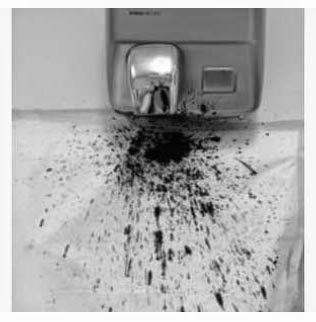Just about everyone I follow on Twitter commented and/or linked to an article about a study claiming that electric hand dryers spew bacteria all over people using restrooms.
The paper, which appeared online in The Journal of Hospital Infection, said that airborne germ counts near jet air dryers were 27 times higher than counts near paper towel dispensers, and counts near warm air dryers were 4.5 times higher. The authors also coated subjects hands with black paint and measured spatter patterns on surrounding walls and persons dressed in disposable coveralls. And a photo from the study shows the dispersal pattern from a warm air dryer.
So case closed—paper towels are better, right?
I’m not so sure. Instead of reading an article about the paper or just the abstract, I obtained a copy of the whole paper. I also found some comments about it from a spokesperson for a hand dryer manufacturer.
What are the flaws in the study?
From the paper’s Methods section: “For each test, gloved hands [not bare hands] were first coated by immersion in a suspension of lactobacilli (107 cfu/mL) that were cultured from a proprietary yoghurt.” FYI, 107 cfu/mL is a lot of bacteria—certainly more than most of us would get on our hands during an average trip to the restroom. It’s the equivalent of putting your hands in liquid feces, except that lactobacilli are benign bugs.
After dipping the gloved hands in bacteria, they weren’t washed. Stick gloved hands in bacteria, don’t wash them, and then stick them in an electric dryer. No doubt there will be dispersal of bacteria around the room.
Also from the Methods section: “For [another] test, gloved hands were coated in a solution of black water-based paint.” Water-based paint on gloves is not the same as water on bare hands. Have you ever seen water all over the walls next to a warm air dryer? I haven’t.
The study was funded by the European Tissue Symposium (ETS). Although this sounds like some kind of scientific conference, it is actually a trade organization of companies that make paper towels. The senior author of the study, Dr. M.H. Wilcox, “has received honoraria from ETS for microbiological advice and travel expenses to attend an ETS meeting.” He also co-authored a consensus statement sponsored by the ETS which happened to find that paper towels are the most hygienic way to try hands.
I have always preferred paper towels. I feel that my hands can be completely dried in far less time than when I use the electric dryers. The drying process helps to reduce bacterial counts on the hands. Some studies have shown that when using electric dryers, many people do not completely dry their hands because it takes too long. See the table below.
A 2012 review of hand drying methods from the Mayo Clinic Proceedings concluded that paper towels were better than electric dryers from a hygiene standpoint, and that paper towels should be used in hospitals. [Note: One of the authors of that study had been a consultant to a paper towel manufacturer.] That’s why you don’t see electric hand dryers in patient care areas of hospitals.
I also hate the noise generated by electric dryers and the faster they are, the noisier they are. You can see the decibel levels of several devices in the table above.
The paper towels vs. electric hand dryers debate has been going on for years not only about hygiene, but also about which method is better ecologically.
Although I don’t believe a word of the much-tweeted European Tissue Symposium study, I still prefer paper towels.


